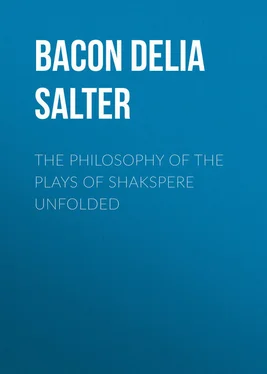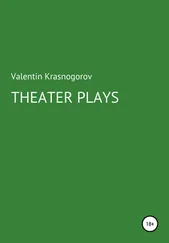Delia Bacon - The Philosophy of the Plays of Shakspere Unfolded
Здесь есть возможность читать онлайн «Delia Bacon - The Philosophy of the Plays of Shakspere Unfolded» — ознакомительный отрывок электронной книги совершенно бесплатно, а после прочтения отрывка купить полную версию. В некоторых случаях можно слушать аудио, скачать через торрент в формате fb2 и присутствует краткое содержание. Жанр: literature_19, foreign_antique, foreign_prose, на английском языке. Описание произведения, (предисловие) а так же отзывы посетителей доступны на портале библиотеки ЛибКат.
- Название:The Philosophy of the Plays of Shakspere Unfolded
- Автор:
- Жанр:
- Год:неизвестен
- ISBN:нет данных
- Рейтинг книги:3 / 5. Голосов: 1
-
Избранное:Добавить в избранное
- Отзывы:
-
Ваша оценка:
- 60
- 1
- 2
- 3
- 4
- 5
The Philosophy of the Plays of Shakspere Unfolded: краткое содержание, описание и аннотация
Предлагаем к чтению аннотацию, описание, краткое содержание или предисловие (зависит от того, что написал сам автор книги «The Philosophy of the Plays of Shakspere Unfolded»). Если вы не нашли необходимую информацию о книге — напишите в комментариях, мы постараемся отыскать её.
The Philosophy of the Plays of Shakspere Unfolded — читать онлайн ознакомительный отрывок
Ниже представлен текст книги, разбитый по страницам. Система сохранения места последней прочитанной страницы, позволяет с удобством читать онлайн бесплатно книгу «The Philosophy of the Plays of Shakspere Unfolded», без необходимости каждый раз заново искать на чём Вы остановились. Поставьте закладку, и сможете в любой момент перейти на страницу, на которой закончили чтение.
Интервал:
Закладка:
CHAPTER I
Single, I'll resolve you. — Tempest .
Observe his inclination in yourself. — Hamlet .
For ciphers, they are commonly in letters, but may be in words. Advancement of Learning .
The fact that a Science of Practice, not limited to Physics and the Arts based on the knowledge of physical laws, but covering the whole ground of the human activity, and limited only by the want and faculty of man, required, in the reigns of Elizabeth and James the First, some special and profoundly artistic methods of 'delivery and tradition,' would not appear to need much demonstration to one acquainted with the peculiar features of that particular crisis in the history of the English nation.
And certainly any one at all informed in regard to the condition of the world at the time in which this science, – which is the new practical science of the modern ages, – makes its first appearance in history, – any one who knows what kind of a public opinion, what amount of intelligence in the common mind the very fact of the first appearance of such a science on the stage of the human affairs presupposes, – any one who will stop to consider what kind of a public it was to which such a science had need as yet to address itself, when that engine for the diffusion of knowledge, which has been battering the ignorance and stupidity of the masses of men ever since, was as yet a novel invention, when all the learning of the world was still the learning of the cell and the cloister, when the practice of the world was still in all departments, unscientific, – any one at least who will stop to consider the nature of the 'preconceptions' which a science that is none other than the universal science of practice, must needs encounter in its principal and nobler fields, will hardly need to be told that if produced at all under such conditions, it must needs be produced covertly. Who does not know, beforehand, that such a science would have to concede virtually, for a time, the whole ground of its nobler fields to the preoccupations it found on them, as the inevitable condition of its entrance upon the stage of the human affairs in any capacity, as the basis of any toleration of its claim to dictate to the men of practice in any department of their proceedings.
That that little 'courtly company' of Elizabethan scholars, in which this great enterprise for the relief of man's estate was supposed in their own time to have had its origin, was composed of wits and men of learning who were known, in their own time, to have concealed their connection with the works on which their literary fame chiefly depended – that that 'glorious Willy,' who finds these forbidden fields of science all open to his pastime, was secretly claimed by this company – that a style of 'delivery' elaborately enigmatical, borrowed in part from the invention of the ancients, and the more recent use of the middle ages, but largely modified and expressly adapted to this exigency, was employed in the compositions of this school, both in prose and verse, a style capable of conveying not merely a double, but a triple significance; a style so capacious in its concealments, so large in its ' cryptic ,' as to admit without limitation the whole scope of this argument, and so involved as to conceal in its involutions, all that was then forbidden to appear, – this has been proved in that part of the work which contains the historical key to this delivery.
We have also incontestable historical evidence of the fact, that the man who was at the head of this new conjunction in speculation and practice in its more immediate historical developments, – the scholar who was most openly concerned in his own time in the introduction of those great changes in the condition of the world, which date their beginning from this time, was himself primarily concerned in the invention of this art. That this great political chief, this founder of new polities and inventor of new social arts, who was at the same time the founder of a new school in philosophy, was understood in his own time to have found occasion for the use of such an art, in his oral as well as in his written communications with his school; – that he was connected with a scientific association, which was known to have concealed under the profession of a curious antiquarian research, an inquiry into the higher parts of sciences which the government of that time was not disposed to countenance; – that in the opinion of persons who had the best opportunity of becoming acquainted with the facts at the time, this inventor of the art was himself beheaded, chiefly on account of the discovery of his use of it in one of his gravest literary works; – all this has been produced already, as matter of historic record merely. All this remains in the form of detailed contemporary statement, which suffices to convey, if not the fact that the forbidden parts of sciences were freely handled in the discussions of this school, and not in their secret oral discussions only, but in their great published works, – if not that, at least the fact that such was the impression and belief of persons living at the time, whether any ground existed for it or not.
But the arts by which these new men of science contrived to evade the ignorance and the despotic limitations of their time, the inventions with which they worked to such good purpose upon their own time, in spite of its restrictions and oppositions, and which enable them to 'outstretch their span,' and prolong and perpetuate their plan for the advancement of their kind, and compel the future ages to work with them to the fulfilment of its ends; – the arts by which these great original naturalists undertook to transfer in all their unimpaired splendour and worth, the collections they had made in the nobler fields of their science to the ages that would be able to make use of them; – these are the arts that we shall have need to master, if we would unlock the legacy they have left to us.
The proof of the existence of this special art of delivery and tradition, and the definition of the objects for which it was employed, has been derived thus far chiefly from sources of evidence exterior to the works themselves; but the inventors of it and those who made use of it in their own speech and writings, are undoubtedly the persons best qualified to give us authentic and lively information on this subject; and we are now happily in a position to appreciate the statements which they have been at such pains to leave us, for the sake of clearing up those parts of their discourse which were necessarily obscured at the time. Now that we have in our hands that key of Times which they have recommended to our use, that knowledge of times which 'gives great light in many cases to true interpretations,' it is not possible any longer to overlook these passages, or to mistake their purport.
But before we enter upon the doctrine of Art which was published in the first great recognized work of this philosophy, it will be necessary to produce here some extracts from a book which was not originally published in England, or in the English language, but one which was brought out here as an exotic, though it is in fact one of the great original works of this school, and one of its boldest and most successful issues; a work in which the new grounds of the actual experience and life of men, are not merely inclosed and propounded for written inquiry, but openly occupied. This is not the place to explain this fact, though the continental relations of this school, and other circumstances already referred to in the life of its founder, will serve to throw some light upon it; but on account of the bolder assertions which the particular form of writing and publication rendered possible in this case, and for the sake also of the more lively exhibition of the art itself which accompanies and illustrates these assertions in this instance, it appears on the whole excusable to commence our study of the special Art for the delivery and tradition of knowledge in those departments which science was then forbidden on pain of death to enter, with that exhibition of it which is contained in this particular work, trusting to the progress of the extracts themselves to apologize to the intelligent reader for any thing which may seem to require explanation in this selection.
Читать дальшеИнтервал:
Закладка:
Похожие книги на «The Philosophy of the Plays of Shakspere Unfolded»
Представляем Вашему вниманию похожие книги на «The Philosophy of the Plays of Shakspere Unfolded» списком для выбора. Мы отобрали схожую по названию и смыслу литературу в надежде предоставить читателям больше вариантов отыскать новые, интересные, ещё непрочитанные произведения.
Обсуждение, отзывы о книге «The Philosophy of the Plays of Shakspere Unfolded» и просто собственные мнения читателей. Оставьте ваши комментарии, напишите, что Вы думаете о произведении, его смысле или главных героях. Укажите что конкретно понравилось, а что нет, и почему Вы так считаете.












